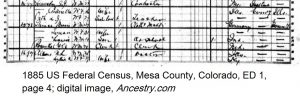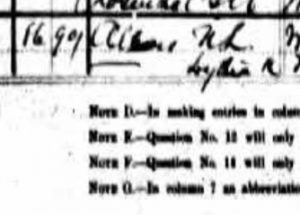
It is easy to see how the the last entry on this census page was transcribed in Ancestry.com‘s “Colorado State Census, 1885” as N. L. Albers instead of U.L. Albers. Initial upper case letters in first names can be difficult enough to transcribe sometimes  when the rest of the name is there to provide a context. The difficulty is significantly worse when initials are all that are used. It can be problematic for a transcriber, unfamiliar with the family, to correctly interpret the initials.
when the rest of the name is there to provide a context. The difficulty is significantly worse when initials are all that are used. It can be problematic for a transcriber, unfamiliar with the family, to correctly interpret the initials.
Fortunately the initials are in the correct order. There’s always a possibility that the initials are reversed making locating the person using an index even more of a challenge. That’s why it’s always advised to search for initials for anyone when you have a given name and to consider the possibility that the initials are reversed in just about any record.
The problem is somewhat compounded in this case as the man, Ulfert Lubben Albers, used his initials quite a bit of his life. So did his father, Lubbe Ulfert Albers. And several other close relatives who were either named Ulfert Lubben Albers or Lubbe Ulfert Albers. It makes keeping them separate even more of a challenge than if they had used their full names. It was not uncommon for those with Germanic names to use initials during this time period. Sometimes it was done to reduce confusion when dealing with those who were not familiar with German names and sometimes it was done mask German heritage.
There are several blanks on this census page in columns for places of birth of the individual and their parents. It is presumed that this indicated the information was unknown. Referencing the enumerator’s instructions would answer this question. In some families the places of birth for children living in the household are not known. Before one wonders what was going on in the mind of the person who answered the question, it is worth remembering that a parent might not have answered the questions. An older sibling might have and may not have known where all of their younger siblings were born. And it is always possible that a neighbor answered the questions. It is not just the Albers family that has blanks. The use of them in the Albers enumeration is not unusual. Many families have similar entries.
This enumeration serves as a good reminder to check those “off-census” years for enumerations that were federal enumerations, but that were only taken in specific states. They can be especially helpful around the 1890 time period.

One response
I well remember my father telling me about some of the neighbors having ‘changed’ their last names. (I rather doubt that it was done “legally”.) He said that it was done during the War so that people would not realize that they had German heritage. And I remember thinking about how the neighbors had known for years that 1) they came from Germany; 2) they were able to speak German; and 3) everyone knew what their name was before the war…and that they had changed it. Obviously it made little impact, I thought, in changing their heritage.
I also recall, following his brother’s sudden death that dad got to do all the paperwork. My uncle’s name was William Earl…and he was most frequently called Earl. However there were official signatures out in the world whereupon he signed his name Earl William…or W. Earl…or William E….or W.E….or just William. The government folks had two deductions made from all that: There were at least five brothers who had died…and that he was the one who owned the whole farm and did all the work and should have all the money. It took dad a great deal of time and letter writing to convince the USA that he and Earl were 50/50 investors in the farm. I got a firm lecture about “choose a name and stick to it!” for all important signatures. Too bad all ancestors did not hear that lecture! It would make our work a LOT easier!